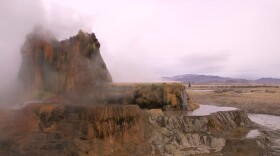On a recent walk along a trail north of Boise, Idaho near dusk, photographer Glenn Oakley stopped and pointed.
“Oh, over there. See that owl?”
A great horned owl was flying out over one of the hills.
Click 'play' to hear the audio version of this story.

Oakley has been a freelance photographer for decades, working with publications like Smithsonian magazine, Life and The New York Times. He’s loved getting out and seeing beautiful landscapes.
“It kept me out of a cubicle,” he said. “That was very important.”
He’s 64 now, and says things have changed since he started in college: from film to digital, from well-paying magazines to low-paying online websites. And to dealing with the new kid on the block—the smartphone. Those changes are steadily eating into freelancers’ incomes.
“$1,500 a day would be kind of a ... plus expenses, that was kind of normal,” he said. “I think that’s a lot harder to get now.”
He’s now up against people who may get a decent photo with their phone and then give it away for free to sites like Flickr or post it on an increasing number of photo-buying apps such as Foap or Snapwire.
Oakley has largely moved onto video because he said that’s where the work is. Digital technology has opened up the world of photography to more people, and he said that’s a good thing, but he sees smartphones as getting between people and their experience of the outdoors.
“Especially if the photograph doesn’t add anything to the world because it’s been shot a million times, maybe just put the camera down and take a breath and see what it looks like with your eyes,” he said.
Missoula, Montana-based photographer Annie Koch agrees that phones and social media can be distracting and stressful, but she relies on them, too.
“Everything is on Instagram,” she said, “and if you're a photographer, that's the best way to get recognized and to be seen is to have a really cohesive, nice-looking Instagram page.”
She says the sheer number of Mountain West nature photographers can be daunting. It’s hard to stand out and be unique, while being absolutely confident that your stuff is worth seeing above all the others.
“I think the hardest part is overcoming that self doubt, and the pressures that come with social media right now,” she said.
But Koch says there’s a distinction between amateur photographers and professionals: one takes photos to capture the moment while the other uses photos as a medium for art. And art generally has something to say. And Koch does have a message.
“I really want to be able to show women in a more realistic way in the outdoors so that women can feel more included and empowered,” she said.
That’s especially important to her she says as a female nature photographer in a male-dominated field.
Across the country, Janet L. Pritchard is a photography and art professor at the University of Connecticut. She says she fell in love with photography in the Mountain West, and like Annie, believes a true professional artist doesn’t just capture a beautiful moment, they make people feel something or see something in a new way.

“And oftentimes those people are photographing things that are less mythic, less ideal, less beautiful, sometimes even very difficult to look at,” Pritchard said.
Of course, someone could create this type of photographic art on a smartphone too. In fact, Pritchard now teaches a course on cellphone photography.
That’s something the famous landscape photographer Ansel Adams would have probably applauded. He predicted and welcomed the idea of digital technology in this medium. Adams died in 1984, but he said this on a BBC program the year before his death:
“The thing that excites me is within not too many years we’re going to have an entirely new medium of expression with electronic image ... and I know the potential is there, I know it’s going to be wonderful.”Find reporter Madelyn Beck on Twitter @MadelynBeck8
Copyright 2019 Boise State Public Radio
This story was produced by the Mountain West News Bureau, a collaboration between Wyoming Public Media, Boise State Public Radio in Idaho, KUER in Salt Lake City, KUNR in Nevada, the O’Connor Center for the Rocky Mountain West in Montana, and KRCC and KUNC in Colorado.
Copyright 2019 Boise State Public Radio News






